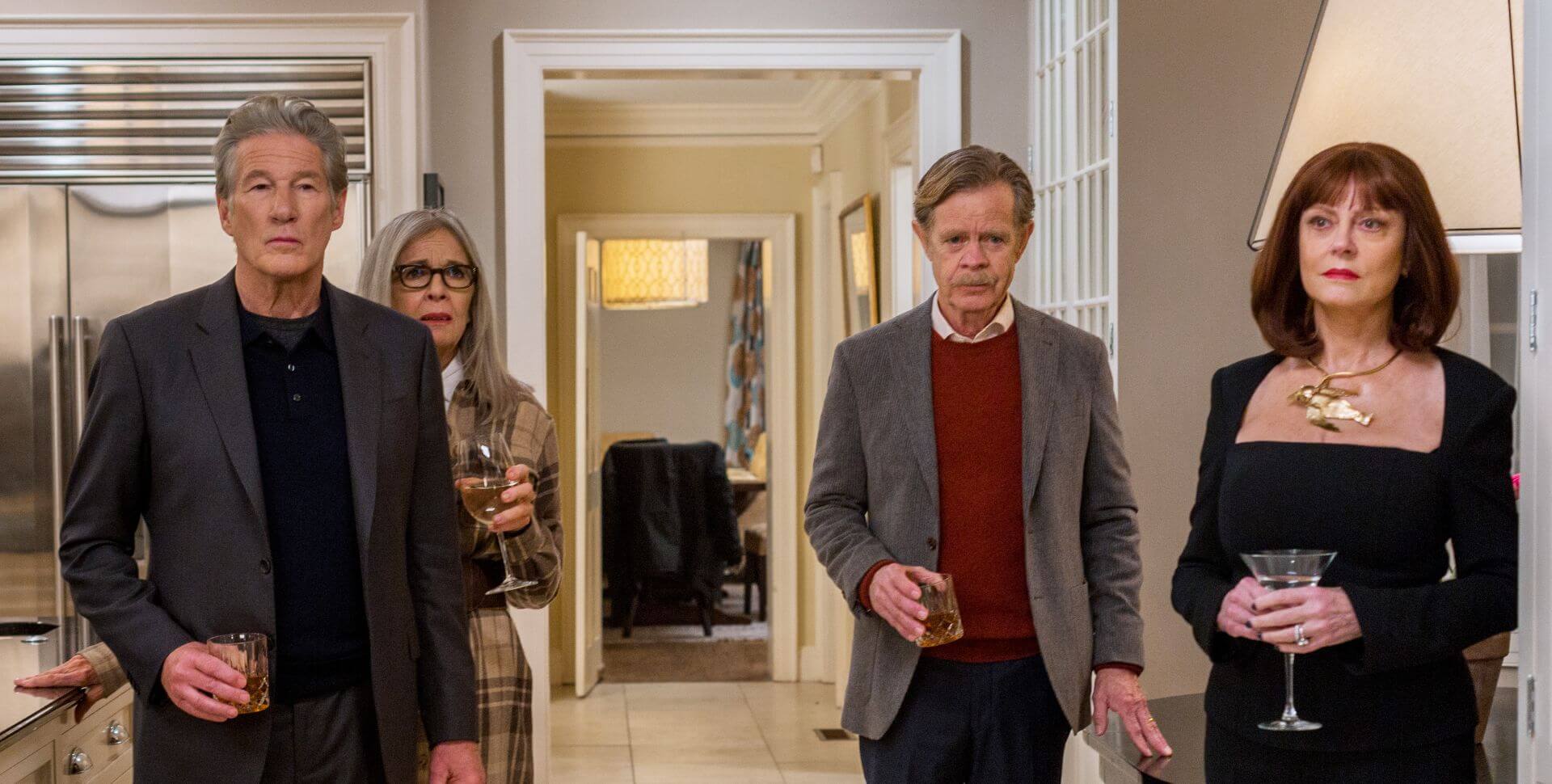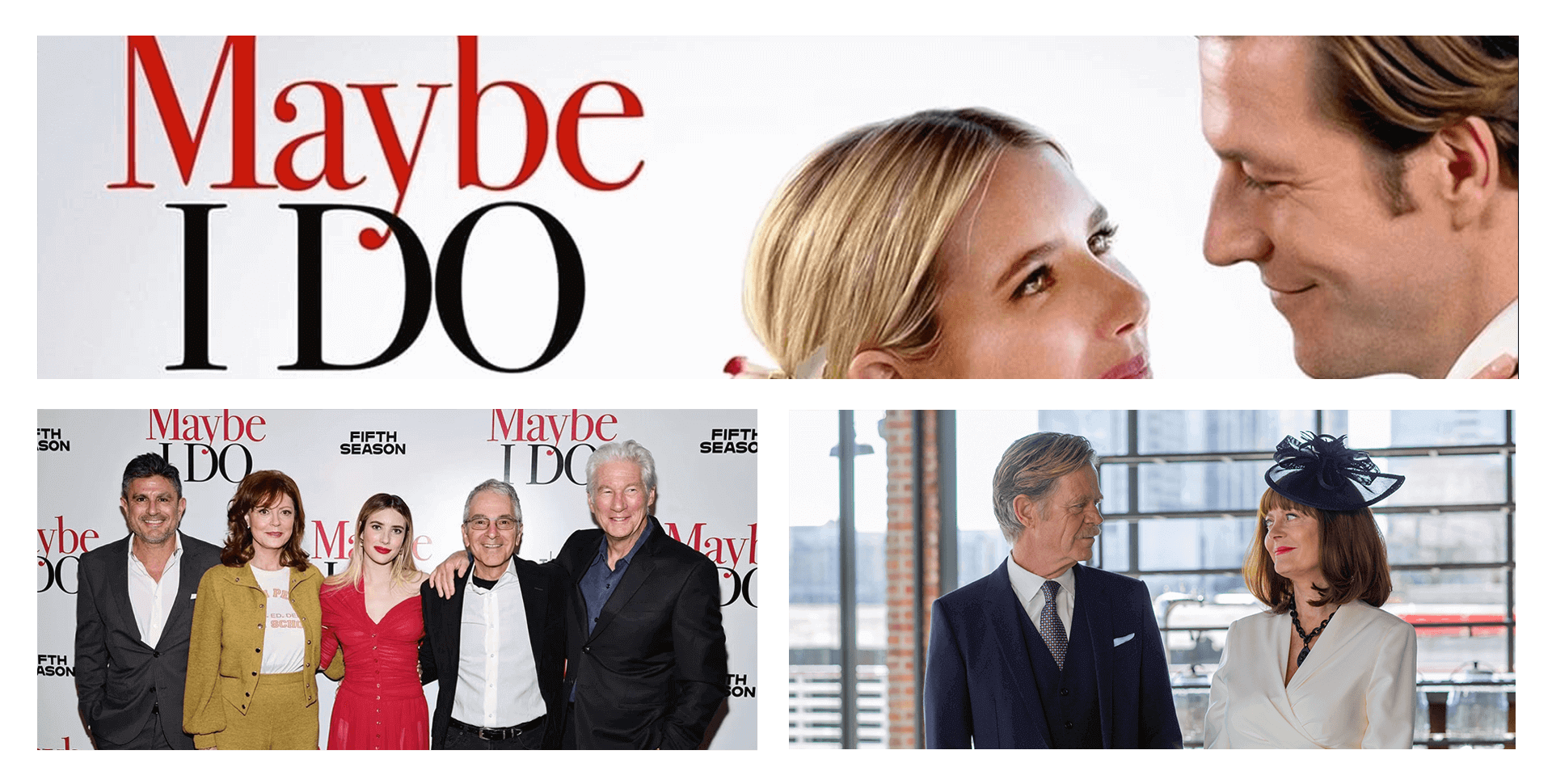Maybe I Do (2023) is a romantic comedy starring Richard Gere, Susan Sarandon, Diane Keaton, Emma Roberts, Luke Bracey, and William H. Macy. A young couple decides to organize for their parents to meet. The whole occasion becomes more complicated than they imagined due to their parents already knowing each other. The following interview is with Michael Jacobs, the writer, and director of Maybe I Do — now available to watch in select theaters beginning January 27, 2023.
What was the inspiration and screenwriting process like for Maybe I Do?
The movie was based on a play I wrote when I was around twenty years old, so written with limited life experience. I revisited that script from the perspective of a man in his sixties. I think the screenwriting process showed me how easy it is to say I love you to someone, but how hard it is to actually take on the responsibility.
The film has such an iconic cast. How was the casting process for the film and were the characters written with specific actors in mind?
The film was written before it was cast. I’m not sure I wrote with a particular casting choice, but never could have envisioned how incredibly lucky we were going to get. Chris Slager from Endeavor (now Fifth Season) suggested Diane Keaton and while I was trying to absorb if she might actually be interested, I’m suddenly at a meeting with her and she comes aboard. She asked who I had in mind for Monica. I told her I’d like to get Susan Sarandon and she said, “You better. She’s the only one who could do it.” The producer Vincent Newman had worked with Emma and sent her the script. We spoke in a Zoom meeting as we were in the middle of the pandemic, and the dialogue resonated with her.
Chris Slager also knew Bill Macy who was the first one to arrive at the location, so we got to spend a couple of days together before the rest of the cast arrived. Bill is an incredible actor and was generous with his time and advice which was an enormous help. Richard Gere and I were supposed to spend five minutes on the phone, which turned into two hours and at the end of the phone call I felt like he was a buddy I’d known for thirty years. In casting Allen it was so apparent that Emma and Luke’s chemistry would help us hit the ground running, they’re so good together, and Luke responded to the script and we were on our way.
What were the influences for the visuals of Maybe I Do — what was it like working with the Cinematographer Tim Suhrstedt?
It’s a very interior movie. The dichotomy in the two homes, one lived in and functional, the other a museum reflecting dysfunction, plays a role in understanding what these families possess or lack in the way of emotional stability, and the potential of continuing as families. It all creates a sort of rooting interest for who belongs together and who doesn’t. Tim Suhrstedt, our Director of Photography, not only rose to the challenge of presenting these two opposing family environments but he was a wonderful partner in keeping not only a pretty ridiculous premise within the realm of [the] natural but in helping to create a visual comfort at our most awkward moments. Tim and I had an easy shorthand between us and I have always been an admirer of his work.
What are your favorite scenes in Maybe I Do — while on the set filming and in the final cut?
There are particular moments in the film that resonate with me for an assortment of reasons. Susan’s delight in introducing herself to Richard and laughing out loud at the sudden potential of the evening. Bill’s scene with Luke when he advises him to marry the woman Bill regrets not marrying. The simplicity of Richard Gere alone in a diner being shown that the world doesn’t belong to him anymore. Diane’s realization on a backyard bench that her husband’s betrayal had so little to do with her, that helplessness took over any possible anger. And the moment that Emma shows Luke that his desire to touch her would be better served by the priority of understanding her. I knew these moments worked on set, but having a partner like Erica Freed Marker in the editing room brought them out even more.

What was it like directing the likes of Susan Sarandon, Richard Gere, William H. Macy, and Diane Keaton?
Can you tell us any highlights?
Having a cast like this respond to the script as they did and then getting to watch them create these characters… to see Diane Keaton and Richard Gere become an everywoman and an everyman confronting mortality and searching for conversation, was fascinating to watch and be part of. Bill’s humanity was exactly what seemed to push Susan’s character away. Monica felt cursed to be married to the most decent man alive. And Susan took what easily could have been Cruella DeVille and offered a look at someone unfulfilled who felt deserving of more. Emma and Luke needing to absorb that their upbringing with these people would not only influence their choices but stop them from having any ability to choose with rationality, was so joyful for me to watch every day.
Where was the movie filmed, and how long was principal photography?
We shot for a month, primarily in and around Montclair and Cranford New Jersey.
How did you find the post-production process with Editor Erica Freed Marker?
I highly recommend being in a room for three months with Erica Freed Marker. Her instinct and facility for good, better, best, and how to get us there are amazing. I’m so grateful for getting to know her and for her contributions to the movie.
The score for Maybe I Do — can you please tell us how it came to be?
In picking out a composer for the film, I got to listen to Lesley Barber’s wonderful work and knew she’d bring a lovely warmth and balance between quick flips between comic and sober. Lesley’s music works so well for us and adds [an] airiness to moments that are purposefully awkward. She is so good in the small spaces. And Ruth B. wrote an incredible theme song, Always You. Whether the uptempo version that’s starts us off or the heartbreaking version at the end, it encapsulates what our characters are living.
What are the films/directors that have influenced you as a filmmaker, including Maybe I Do?
I love films or plays or television or any communicated idea that overwhelms us with a sense of feeling that we should pay complete attention to. I was a kid rearranging my room with a small tv on, and it was The Million Dollar Movie on WOR, channel 9 I think. And rearranging the room which was the priority soon gave way to the movie, which was Zero Mostel jumping up and down on Gene Wilder, and I sat on the floor and absorbed every moment, and wondered how anything could be so brilliant. There are too many other influences and obvious choices to start listing but a few less obvious movies that come on that make me stop what I’m doing and sit on the floor are Dr. Strangelove, Some Like It Hot, Waiting For Guffman, and Arthur.
Favorite movies from the past decade?
No coincidence when you ask of favorites from the last decade Jojo Rabbit springs to mind.
Which themes and subject matters interest you as a filmmaker?
In any project I’ve been involved with my hope is always to motivate an audience to give us their attention and feel like their time was well spent. I realize just how saccharine that sounds but it’s never mattered as much to me whether I could make an audience laugh or think or feel something. It’s getting them to pay attention and letting what we’re doing wash over them. That’s when I get the opportunity that perhaps a moment stays with them. There are so many moments that I summon up from a lifetime of watching people’s work. In this world, where we seem more to be taken apart than put together, I remember this moment from Billy Elliot. When the father is wrestled to the ground by his oldest son to stop him from breaking the strike and wants to know why. And the father says, It’s for Billy. For all we know he’s a fucking genius. That. The moment you decide to give something your attention because maybe it’s good.
Watch Maybe I Do Now
